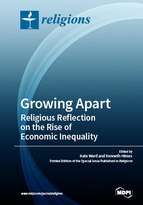Growing Apart: Religious Reflection on the Rise of Economic Inequality
A special issue of Religions (ISSN 2077-1444).
Deadline for manuscript submissions: closed (15 February 2017) | Viewed by 90891
Special Issue Editors
Interests: economic justice; virtue ethics; feminist ethics; Catholic social teaching
Special Issue Information
Dear Colleagues,
The Special Issue arises from a year-long interdisciplinary faculty seminar at Boston College that examined the growing economic inequality in the United States and globally. The issue also publishes papers on that topic, delivered at a conference at Boston College in Spring, 2016.
This Special Issue sheds light on the nature of economic equality, which becomes pernicious. Its scope, consistent with the seminar and conference, will be interdisciplinary, proposing to illustrate how theological and ethical reflection on inequality can be enriched by incorporating various disciplinary perspectives.
Prof. Dr. Kate Ward
Prof. Dr. Kenneth Himes
Guest Editors
Manuscript Submission Information
Manuscripts should be submitted online at www.mdpi.com by registering and logging in to this website. Once you are registered, click here to go to the submission form. Manuscripts can be submitted until the deadline. All papers will be peer-reviewed. Accepted papers will be published continuously in the journal (as soon as accepted) and will be listed together on the special issue website. Research articles, review articles as well as short communications are invited. For planned papers, a title and short abstract (about 100 words) can be sent to the Editorial Office for announcement on this website.
Submitted manuscripts should not have been published previously, nor be under consideration for publication elsewhere (except conference proceedings papers). All manuscripts are thoroughly refereed through a double-blind peer-review process. A guide for authors and other relevant information for submission of manuscripts is available on the Instructions for Authors page. Religions is an international peer-reviewed open access monthly journal published by MDPI.
Please visit the Instructions for Authors page before submitting a manuscript. Submitted papers should be well formatted and use good English. Authors may use MDPI's English editing service prior to publication or during author revisions.
Keywords
- economic inequality
- social justice
- interdisciplinary studies






